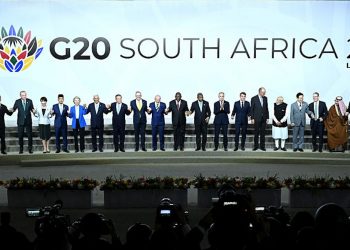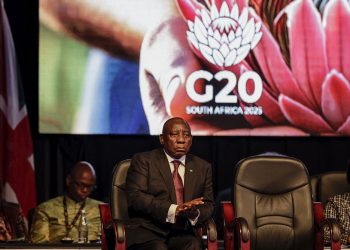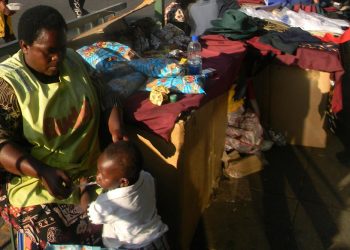It’s two years since Kenyan president William Ruto, in what seemed like a political gamble, rolled out a government-run microcredit scheme popularised as the Hustler Fund. Worth 50 billion shillings (US$409 million) a year over a five-year period, the low-interest loans were touted as the “magic formula” to start or grow micro, small and medium businesses. Now the fund faces an uncertain future owing to a high default rate. Eric Magale, who studies the complex relationship between finance, livelihoods and development, explains what went wrong.
What is the Hustler Fund?
Kenya’s 2022 general election campaigns were held amid a severe cost of living crisis and deepening poverty levels. The two leading candidates proposed two distinct economic strategies.
The Azimio coalition led by Raila Odinga proposed a monthly cash transfer for 2 million poor families.
But it was the proposal of the winning Kenya Kwanza coalition led by Ruto that saw the light of day. The coalition campaign self-identified as the “hustler movement” to appeal to people who were struggling economically. Ruto pledged a Hustlers’ Fund which would dispense microloans straight to mobile phones “at single-digit interest”. The intention was that the loans would be used to start businesses and help “hustlers” make their way out of poverty. They were primarily aimed at women and young people.
To qualify for a loan, all the applicant requires is a valid national identity document and a registered mobile number. A person can borrow a small amount (500-50,000 shillings or roughly US$4-400) for 14 days. The loans are given and repaid through the M-Pesa platform.
Unlike traditional loans offered by banks, loans offered under the scheme don’t require collateral. Instead, it makes use of credit scores to assess potential borrowers. The hope is that access to financial services will lift people out of poverty.
The significance of the Hustler Fund was that the government became a micro-lender. This controversial new role was applauded by the financial inclusion lobby as a way to correct failures in the credit market.
What was the background to the fund?
Digital lending entails offering loans though digital channels such as mobile applications or websites. These are integrated with a borrower’s mobile money account, through which they receive and repay their loan. As opposed to the traditional, in-person way of giving secured loans, digital lending is impersonal, given that it uses credit scores to instantaneously assess a loan application. Digital loans are also unsecured – they dispense with the need for collateral. They are often used for short-term purposes because they are small amounts with a short loan tenure.
Digital lending in Kenya started in 2012 with the launch of M-shwari. The digital lending industry grew fast while remaining unregulated. At the time of my doctoral research on the digital lending industry in 2021 and 2022, there were a few hundred digital lenders in the market. But the industry was dogged by high interest rates, stiff penalties for default and hidden fees.
Ruto’s initiative came at a time when the digital credit industry was at its peak and when the Central Bank of Kenya started to regulate it in a bid to root out unethical practices. By October 2024, regulation efforts had seen the number of licensed digital lenders reduce to 85.
Digital loans are more expensive than other formal sources of credit in Kenya. A 2020 study found that many lenders charged annual interest upwards of 300%. In some cases it was impossible to tell what the credit cost amounted to. High interest was intertwined with overly aggressive debt collection strategies and misuse of personal data. Lenders sometimes threatened to shame defaulters by revealing how much they owed.
The key difference between the loan offered under Ruto’s scheme and other digital loans was the low interest rate, set at 8%. Other digital loans charge interest of between 20% and 30% for a 30-day loan.
After its launch in November 2022, Kenyans took up the hustler loan in large numbers. As at August 2024, there were roughly 21 million borrowers. The Hustler Fund has the most active loans in the market, taking a 45% share of the active loans in the digital lending industry. M-Shwari has 28% of all active loans.
What’s gone wrong?
Most borrowers haven’t repaid their loans. The government reported that 19 million of the 21 million Kenyans who took the hustler loan have defaulted. This has left only 2 million borrowers who continue to borrow regularly.
In absolute terms, the loan defaulted amount as at October 2023 stood at 10 billion shillings, representing roughly 27% of all disbursements. This represents a significantly higher default rate than that of other formal credit providers, which stood at roughly 15%. This is high. Other non-bank digital lenders such as Tala report default rates of as low as 5%.
The government has ramped up debt tracing measures, including a proposal to raid the M-Pesa accounts of defaulters. This is a last-gasp attempt to sustain the fund, which was designed to operate as a revolving fund. In other words, repaying the loan would make money available to lend to someone else.
There is one chief reason why the fund faces a sustainability crisis. The loans dispensed are largely used for day-to-day household consumption rather than income-generating purposes. Nearly 70% of small business owners who tapped the fund’s microloans in 2023 used it for household expenses. Only 18.1% applied it to their businesses.
As I found in my research, most of the 21 million loan applicants would only qualify for the minimum amount, between 500 and 1,000 shillings. This is hardly enough to start up or working capital even for small enterprise.
Far from building up capital, the loans just get people into worse debt. This was evidenced in my previous research as well as the work of several other scholars. Its dangers and extent have recently been documented in the media.
What lessons can be drawn, and what next?
Proponents of financial inclusion assert that digital loans can be used as a springboard to entrepreneurship. This narrative has been carried by the powerful financial inclusion lobby and has been bought up by the political class. However, it simply does not work in practice.
As I argued on the basis of my research in Kenya, financial inclusion doesn’t mean borrowing for convenience. It must be designed so it doesn’t worsen poverty and inequality.
The challenges are not unique to Kenya. The microcredit model has permeated the global south since the 1990s with the backing of the international development community. They say extending credit alleviates poverty, in spite of evidence to the contrary.
The moral justification to refuse to pay debt has been highlighted by anthropologists Jean-Pierre Olivier de Sardan and David Graeber, who argue that refusing to pay a loan can be considered legitimate action in an immoral, corrupt or unjust society. In his book Weapons of the Weak, American political scientist and anthropologist
James C Scott views this as a new form of peasant resistance. That is, the ability of people to redefine and subvert policies and strategies of the elite.
It is unclear what the Hustler Fund’s failure and imminent collapse will mean for politics of the day. But the time is ripe for a rethink of the fund.
Eric Magale does not work for, consult, own shares in or receive funding from any company or organisation that would benefit from this article, and has disclosed no relevant affiliations beyond their academic appointment.
















